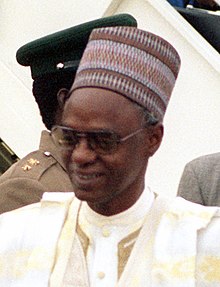
Back Shehu Shagari Afrikaans شيخو شاجاري Arabic Shehu Shagari AST Shehu Shagari Catalan Shehu Shagari Welsh Shehu Shagari Danish Shehu Shagari German Shehu Shagari Esperanto Shehu Shagari Spanish Shehu Shagari Basque
Shehu Shagari | |||||||||||||||||||||||||||||||||||||||||||||||||||||||||||
|---|---|---|---|---|---|---|---|---|---|---|---|---|---|---|---|---|---|---|---|---|---|---|---|---|---|---|---|---|---|---|---|---|---|---|---|---|---|---|---|---|---|---|---|---|---|---|---|---|---|---|---|---|---|---|---|---|---|---|---|
 Shagari in 1980 | |||||||||||||||||||||||||||||||||||||||||||||||||||||||||||
| 6th President of Nigeria | |||||||||||||||||||||||||||||||||||||||||||||||||||||||||||
| In office 1 October 1979 – 31 December 1983 | |||||||||||||||||||||||||||||||||||||||||||||||||||||||||||
| Vice President | Alex Ekwueme | ||||||||||||||||||||||||||||||||||||||||||||||||||||||||||
| Preceded by | Olusegun Obasanjo as Military Head of State of Nigeria | ||||||||||||||||||||||||||||||||||||||||||||||||||||||||||
| Succeeded by | Muhammadu Buhari as Military Head of State of Nigeria | ||||||||||||||||||||||||||||||||||||||||||||||||||||||||||
| |||||||||||||||||||||||||||||||||||||||||||||||||||||||||||
| Personal details | |||||||||||||||||||||||||||||||||||||||||||||||||||||||||||
| Born | 25 February 1925 Shagari, Northern Region, British Nigeria | ||||||||||||||||||||||||||||||||||||||||||||||||||||||||||
| Died | 28 December 2018 (aged 93) Abuja, Nigeria | ||||||||||||||||||||||||||||||||||||||||||||||||||||||||||
| Political party | National Party of Nigeria | ||||||||||||||||||||||||||||||||||||||||||||||||||||||||||
| Other political affiliations | Northern People's Congress (1951–1966) | ||||||||||||||||||||||||||||||||||||||||||||||||||||||||||
| Spouses | |||||||||||||||||||||||||||||||||||||||||||||||||||||||||||
| Children | Muhammad Bala Shagari Aminu Shehu Shagari Abdulrahman Shehu Shagari, amongst others | ||||||||||||||||||||||||||||||||||||||||||||||||||||||||||
| Relatives | Mukhtar Shehu Shagari (Nephew) Bello Bala Shagari (grandson) | ||||||||||||||||||||||||||||||||||||||||||||||||||||||||||
| Alma mater |
| ||||||||||||||||||||||||||||||||||||||||||||||||||||||||||
| Occupation |
| ||||||||||||||||||||||||||||||||||||||||||||||||||||||||||
Shehu Usman Aliyu Shagari GCFR (ⓘ; 25 February 1925 – 28 December 2018) was a Nigerian politician who was the first democratically elected president of Nigeria, after the transfer of power by military head of state General Olusegun Obasanjo in 1979, which gave rise to the Second Nigerian Republic.[2]
An experienced politician, he briefly worked as a teacher before entering politics in 1951; and was elected into the House of Representatives in 1954. At various times between 1958 through independence of Nigeria in 1960 and 1975, he held a cabinet post as a federal commissioner or as a federal minister. As president, Shagari presided over the mass deportation of West African migrants in 1983, which primarily impacted Ghanaian migrants in Nigeria.[3]
- ^ Shagari, Shehu Usman Aliyu (2001). Shehu Shagari : beckoned to serve : an autobiography. Internet Archive. Nigeria : Heinemann ed. books (Nigeria) plc. p. 89. ISBN 978-978-129-932-2.
- ^ "Shehu Shagari obituary". The Guardian. 9 January 2019. Archived from the original on 22 September 2024. Retrieved 24 February 2022.
- ^ Solomonov, M. (15 August 2015). "Ghana Must Go: Exodus From Nigeria Remembered". Yen.com.gh. Archived from the original on 25 April 2018. Retrieved 14 May 2017.